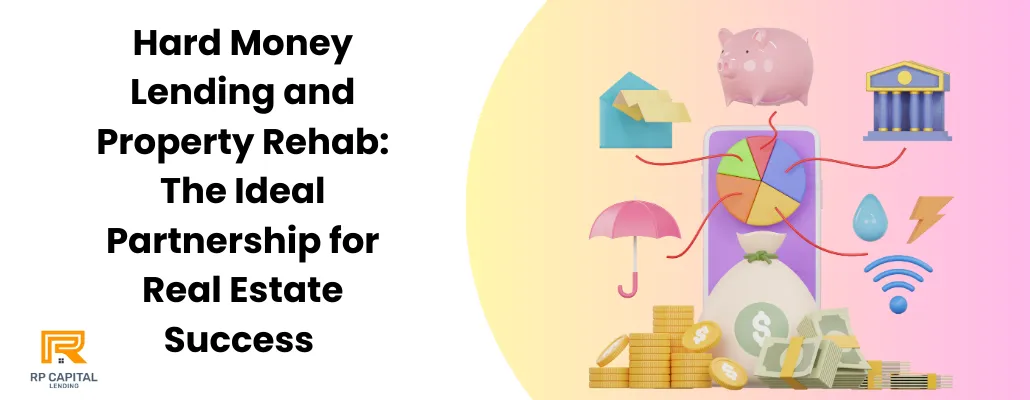Blog

Hard Money Lending and Property Rehab: The Ideal Partnership for Real Estate Success
In the fast-paced world of real estate investment, timing is everything. The difference between a successful flip and a missed opportunity often boils down to one critical factor: access to financing. For many investors, especially those focused on property rehabilitation, traditional bank loans are simply too slow and restrictive.
Enter hard money lending—a financing solution tailored to the unique needs of property rehabbers. In this blog, we’ll explore why hard money lending and property rehab are a perfect match, offering real estate investors the speed, flexibility, and funding they need to turn distressed properties into profitable investments.
What is Hard Money Lending?

Hard money lending refers to the practice of providing loans secured by real property. Unlike traditional bank loans, which are based on the borrower’s creditworthiness and income, hard money loans are based on the value of the property being used as collateral.
This makes them a popular choice for investors who may not qualify for conventional financing or need funding quickly to seize an opportunity.
The Synergy Between Hard Money Lending and Property Rehab

Hard money lending has become a go-to financing option for real estate investors, particularly those involved in property rehab. Here’s why this combination works so well:
1. Speed of Access to Funds
Traditional bank loans can be notoriously slow, often taking weeks or even months to secure. This can be a deal-breaker in the competitive real estate market, where opportunities come and go quickly. Hard money lenders, however, understand the urgency of real estate deals. They can often approve and fund loans in a matter of days, giving investors the agility to act quickly on promising rehab opportunities.
2. Flexibility in Loan Structures
Unlike conventional lenders who typically offer rigid loan terms, hard money lenders are known for their flexibility. They can tailor loans to the specific needs of each project, whether it’s a quick flip or a more extensive rehab. This flexibility extends to interest rates, repayment schedules, and even the percentage of the purchase price that can be financed. This customized approach allows investors to structure their financing in a way that best supports their rehab strategy.
3. Asset-Based Lending
One of the biggest advantages of hard money lending is that it’s primarily based on the value of the property being rehabbed, rather than the borrower’s credit score or income. This makes it an attractive option for investors who may not qualify for traditional loans due to a lack of income documentation or past credit issues. By securing the loan against the property, hard money lenders mitigate their risk, allowing them to lend more freely to a broader range of investors.
4. Short-Term Loans for Quick Turnarounds
Property rehabs are generally short-term projects, often completed within 6 to 12 months. Hard money loans are designed with this in mind, typically offering terms that range from 6 to 24 months. This alignment between loan duration and project timeline allows investors to focus on the rehab without the burden of long-term debt. Once the property is rehabbed and sold, the loan is paid off, and the investor can move on to the next project.
5. Leveraging Equity for Higher Returns
Hard money loans enable investors to leverage the equity in their existing properties to finance new rehab projects. This strategy can significantly increase the potential return on investment (ROI) by allowing investors to take on multiple projects simultaneously or to invest in higher-value properties that offer greater profit margins. With the right rehab strategy, the cost of the loan is more than offset by the increased profits from a successful flip.
How Hard Money Lending Works in Property Rehab?

To fully understand why hard money lending and property rehab are such a powerful combination, it’s important to understand how these loans work in the context of a rehab project.
1. Loan Application and Approval
The first step is identifying a property with rehab potential. Investors then approach a hard money lender with details about the property and their rehab plan. Because these loans are based on the property’s after-repair value (ARV), the lender will evaluate the potential value of the property post-rehab. This assessment is crucial in determining the loan amount.
2. Loan Terms and Disbursement
Once the loan is approved, the terms are set, including the interest rate, loan-to-value (LTV) ratio, and repayment schedule. The loan is then disbursed in stages, often with an initial lump sum followed by additional disbursements as the rehab progresses. This staged funding ensures that the loan is used specifically for the rehab and that the project stays on track.
3. Rehab and Sale
With the funding secured, the investor can proceed with the rehab, using the loan to cover the costs of materials, labor, and other expenses. Once the rehab is complete, the property is sold, ideally at a profit that exceeds the cost of the loan and rehab expenses. The loan is then repaid from the proceeds of the sale, and the investor pockets the profit.
The Benefits of Hard Money Lending for Property Rehab
The advantages of using hard money loans for property rehab go beyond just quick access to funds and flexible terms. Here are some additional benefits:
No Prepayment Penalties: Unlike some traditional loans, hard money loans often do not have prepayment penalties, allowing investors to pay off the loan early without incurring extra costs.
Focus on the Property, Not the Borrower: Hard money lenders are primarily concerned with the value of the property and the potential for a successful rehab, rather than the borrower’s financial history. This opens doors for many investors who might otherwise be excluded from traditional financing.
Higher Approval Rates: Because the loan is secured by the property itself, hard money lenders can approve loans that traditional banks might reject. This higher approval rate means more opportunities for investors to capitalize on promising rehab projects.
Creative Financing Options: Hard money lenders often provide creative financing options, such as interest-only payments or balloon payments, that can be structured to fit the specific needs of the rehab project.
FAQs
1. What is hard money lending?
Hard money lending is a form of asset-based financing where loans are secured by real estate properties. It’s commonly used by real estate investors for short-term projects like property rehabs and flips.
2. How does hard money lending differ from traditional lending?
Hard money loans differ from traditional loans in several key ways: they are asset-based rather than credit-based, offer faster approval and funding, and provide more flexible loan terms tailored to the specific project.
3. Who can benefit from hard money loans?
Real estate investors, especially those involved in property rehabs or flips, can benefit from hard money loans. These loans are ideal for investors who need quick access to funds and flexible terms.
4. What are the risks associated with hard money loans?
The primary risks of hard money loans include higher interest rates and short loan terms. These loans can be expensive if the rehab project takes longer than expected, or if the property does not sell quickly after the rehab is completed.
5. How do I find a reputable hard money lender?
To find a reputable hard money lender, start by asking for recommendations from other real estate investors, researching online reviews, and checking the lender’s credentials and experience in the industry.
Conclusion
Hard money lending and property rehab create a powerful synergy that can unlock significant opportunities for real estate investors. With fast access to funds, flexible loan structures, and the ability to leverage equity, hard money loans are an invaluable tool for those looking to turn distressed properties into profitable ventures. Whether you’re a seasoned investor or just starting out, understanding the benefits of this partnership can help you make smarter, more profitable investment decisions.
RP Capital Lending is a d.b.a of RP Capital Partners Inc (NMLS # 2469193) | Privacy Policy
Copyright © 2022. All Rights Reserved.
Disclaimer: Loans only apply to non-owner occupied properties. Rates, terms and conditions offered only to qualified borrowers, may vary upon loan product, deal structure, other applicable considerations, and are subject to change at any time without notice.

